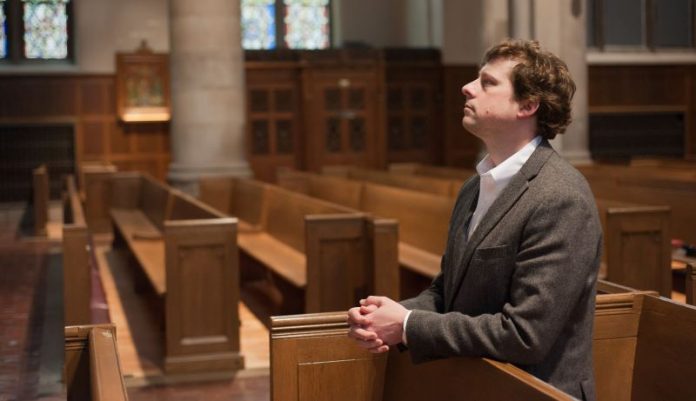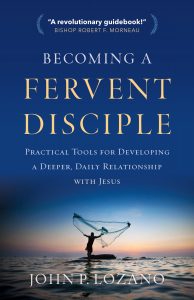
Creating the right conditions
JOHN P. LOZANO
While there are a multitude of ways to encounter Jesus, it is important to have a focus, a
plan, or a program in our life that helps to facilitate this encounter. When a gardener plants a seed in the ground he knows he cannot make the seed germinate and grow, because it comes about as a gift, beyond our control. But he also knows that by creating the right conditions for germination, the potential for this growth, this life, is greatly increased. It is the watering, fertilizing, and sunlight offered to the plant that is essential to its growth.
Thomas Merton put it this way:
“All we can do with any spiritual discipline is produce within ourselves something of the silence, the humility, the detachment, the purity of heart, and the indifference which are required if the inner self is to make some shy, unpredictable manifestation of his presence” (The Inner Experience: Notes on Contemplation, p. 7).
Here are some thoughts on how to create conditions that greatly increase our potential
for personally encountering Jesus.
Pope Francis’ plan
On the first page of his apostolic exhortation “The Joy of the Gospel,” Pope Francis lays out
a five-step program for opening ourselves to an encounter with Jesus.
1. Openness
2. Daily Commitment
3. Way of Thinking
4. Risk
5. Repentance
These steps may seem simple, but they are powerful, urgent advice:
I invite all Christians, everywhere, at this very moment, to a renewed personal encounter with Jesus Christ, or at least an openness to him encountering you; to do this unfailingly each day. No one should think that this invitation is not meant for him or her, since “no one is excluded from the joy brought by the Lord.” The Lord does not disappoint those who take the risk; whenever we take a step towards Jesus, we come to realize he is already there, waiting with open arms. Now is the time to say to Jesus; “Lord, I have let myself be deceived; in a thousand ways I have shunned your love, yet here I am once more, to renew my covenant with you. I need you. Save me once again, Lord, take me once more into your redeeming embrace.” (Evangelii Gaudium, “The Joy of the Gospel,” 3)
1. Openness
“At least an openness to him encountering you.”
While the gift of faith and encountering Jesus is primarily a movement of God toward us — it is God who takes the initiative and seeks us out — it does require a disposition of “openness” on our part to allow this encounter to happen.
When Nicodemus comes to Jesus in John’s Gospel, we find him coming at night. Darkness is a biblical image of unbelief, yet at the same time Nicodemus is coming toward the light, toward Jesus. This is a biblical expression of the kind of “openness” to Jesus that is the required disposition of those who are seeking to encounter him in a new way. How beautiful are the pope’s words in this regard: “or at least an openness to him encountering you.” This takes a lot of pressure off of us in our desire to encounter Jesus.
We do not make this encounter happen, and it is not about any particular technique or how well we do in our attempts to encounter Jesus. It is ultimately a gift of God’s grace and love toward us. All we essentially do is show up and be open to receiving Jesus anew in our lives. In the pope’s words, all we need to say is: “here I am once more.” Be open and you will encounter Jesus.
2. Daily commitment
“Do this unfailingly each day.”
The life of faith and our encounter with the risen Jesus is not a one-and-done experience. The reason the journey of faith is so adventurous and at times thrilling is because it never ends and only gets more wonderful and profoundly impactful in our lives. There is always more.
We can all identify with Nicodemus: We all come with some “unfaith,” some aspect of our person that is still in darkness, and we need to come toward the light over and over, every day. It is this regular commitment to prayer and seeking Jesus that changes everything.
3. Way of thinking
“No one should think this invitation is not meant for him or her.”
In the New Testament, the word used for “conversion” means to “have a new mind.” Not only does our encounter with Jesus transform our hearts, it is meant to transform our minds, the way we think and perceive ourselves, others, God, and life itself. There is a significant tendency within many of us to write off our capacity to encounter Jesus because of how we think of ourselves. We say, “I am just an average person. I am not very spiritual.” The way we think about ourselves in relation to God and our capacity for encountering God can severely limit our encounter with Jesus.
4. Risk
“The Lord does not disappoint those who take the risk.”
Faith, like love, always involves risk. At the heart of faith and openness to encountering Jesus is trust. In the Gospels, the expression Jesus himself utters about faith is almost exclusively a call away from fear, and to trust. “Fear is useless; what is needed is trust” (Luke 8:50). These words should be written on our screen savers and placed on the refrigerator because they express the most important disposition of the human heart regarding our openness, or lack thereof, to encountering Jesus in our lives.
5. Repentance
“Now is the time to say to Jesus; ‘Lord, I have let myself be deceived; in a thousand ways I have shunned your love, yet here I am to renew my covenant with you. I need you. Save me once again, Lord, take me once more into your redeeming embrace.”
Pope Francis beautifully expresses the central place for encountering Jesus in our lives: mercy. The encounter of human sinfulness and divine mercy is an encounter like no other in the human experience. It is the greatest source of personal transformation in our lives.
How wonderful is the Christian belief that no human sinfulness is not already forgiven by God. How accessible is our encounter with the God of mercy when all we need to do is to acknowledge our denial of God’s love and to come “once more into your redeeming embrace.” As St. Teresa of Ávila put it so well: “All we need to do to begin again, is to begin again.”
In reflecting on these five steps, it is important to see how they all go together. Developing a disposition within ourselves that is open, trusting, seeking, accepting, and willing to bring every obstacle to this encounter to him is the way of life for the fervent disciple who encounters the love of God in Jesus over and over along the journey of faith.
Personal reflection
■ What aspect(s) of the above plan do you need in your life?
■ Is there something you would add to this five-step plan?
 Excerpted from Becoming A Fervent Disciple: Practical Tools for Developing a Deeper, Daily Relationship with Jesus, by John P. Lozano. Copyright 2018. Published by Twenty-Third Publications (TwentyThirdPublications.com). Used with permission. All rights reserved.
Excerpted from Becoming A Fervent Disciple: Practical Tools for Developing a Deeper, Daily Relationship with Jesus, by John P. Lozano. Copyright 2018. Published by Twenty-Third Publications (TwentyThirdPublications.com). Used with permission. All rights reserved.
[Editor’s note: The text has been modified to fit this format.]
John P. Lozano is a permanent deacon and has worked for 24 years at Villanova University in campus ministry and as an instructor in the Department of Theology and Religious Studies. He is the founder of Encountering Jesus Today — dedicated to helping others engage the Good News of Jesus Christ.
This article was originally published in Catechist magazine, February 2020.
PHOTO: LISA JULIA PHOTOGRAPHY/BAYARD INC.




